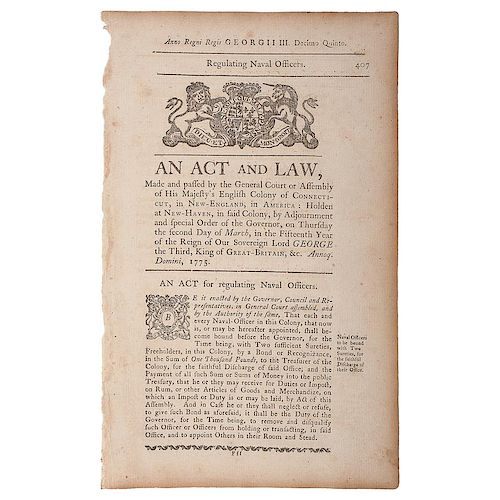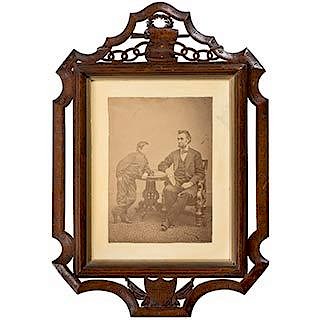Birth of the American Navy, Colonial Act for Regulating Naval Officers, 1775 Imprint Issued by King George III
About Seller
6270 Este Ave.
Cincinnati , OH 45232
United States
With offices in Cincinnati, Cleveland and Denver, Cowan’s holds over 40 auctions each year, with annual sales exceeding $16M. We reach buyers around the globe, and take pride in our reputation for integrity, customer service and great results. A full-service house, Cowan’s Auctions specializes in Am...Read more
Two ways to bid:
- Leave a max absentee bid and the platform will bid on your behalf up to your maximum bid during the live auction.
- Bid live during the auction and your bids will be submitted real-time to the auctioneer.
Bid Increments
| Price | Bid Increment |
|---|---|
| $0 | $25 |
| $500 | $50 |
| $1,000 | $100 |
| $2,000 | $250 |
| $5,000 | $500 |
| $10,000 | $1,000 |
| $20,000 | $2,500 |
| $50,000 | $5,000 |
| $100,000 | $10,000 |
About Auction
Sep 8, 2017 - Sep 9, 2017
Cowan's Auctions dawnie@cowans.com
- Lot Description
An Act for Regulating Naval Officers, 1p, 7 x 11 in. Officially titled: An Act and Law, made and passed by te General Court or Assembly of His Majesty's English Colony of Connecticut, in New-England, in America : Holden at New-Haven, in said Colony, by Adjournment and Special Order of the Governor, on Thursday the second Day of March, in the Fifteenth Year of the Reign of Our Sovereign Lord George the Third, King of Great-Britain, &c. Annoq. Domini, 1775. Under the Kings crest, requiring that naval officers post a bond of one thousand pounds, to guarantee that they turn over taxes or import duties to the king's treasury. If they failed to pay either the bond or duties, they were to be removed from office. The British concern was clearly the King's coffers.
About a month later, the Revolutionary War began. In July, the Connecticut General Assembly authorized the procurement of two armed vessels, but some of the council feared a kind of "arms race" in an attempt to match British sea power - an obvious impossibility for a small colony. Governor Trumbull authorized outfitting the Minerva, a 108-ton ship, and set out to acquire a small spy vessel to keep them informed about British activities along the coast. In August the Britannica was acquired and renamed Spy.
By the end of the year, the General Assembly authorized more vessels, including another warship, some row galleys (operating mainly on the Hudson River) and the Turtle, considered the first submarine used in warfare. By 1779, however, all of Connecticut's vessels were captured or destroyed, and none were replaced before the end of the war.
In August, Rhode Island passed a resolution to build a navy, "at the Continental expense," to protect the seaboard colonies and to "effectively annoy our enemies..."
The Continental Congress, however, which did not get around to authorizing a navy until October 1775, with seven vessels of varying sizes in the first group. The US Navy officially recognizes October 13, 1775 as its birthday.
By December, Congress also named four captains, Dudley Saltonstall, Abraham Whipple, Nicholas Biddle, and John Burrows Hopkins (of the Alfred, Columbus, Andrew Doria, and Cabot, respectively), and five 1st lieutenants, including John Paul Jones, plus several second and third lieutenants. Esek Hopkins was appointed commander in chief of the Continental Navy. George Washington had already begun acquiring ships, some of which were paid for out of his own pocket. The French allowed the Americans to "borrow" a few of her ships until France officially joined the American cause in mid-1778.
At the end of the war, the 11 surviving ships (of 65 built, converted, loaned, captured) were sold by the Continental Congress. John Adams had been active in building the navy during the Revolutionary War, and drafting its regulation. During his single term as President, he re-established the American Navy, during the "quasi-war" with France, which was primarily a naval squabble. Adams is generally credited as the "Father of the American Navy."
Condition
Light overall toning, with slightly heavier toning along the edges.
Item is in very good condition and is a fine example of period empire furniture.
Eliminate the Hassle of Third-Party Shippers: Let Cowan's Ship Directly To You! If you'd like a shipping estimate before the auction, contact Cowan's in-house shipping department at shipping@cowans.com or 513.871.1670 x253 - Shipping Info
-
SHIPPING. At the request of the buyer, Cowan's will authorize the shipment of purchased items. Shipments usually occur within two weeks after payment has been received. Shipment is generally made via UPS Ground service. Unless buyer gives special instructions, the shipping method shall be at the sole discretion of Cowan's Auctions, Inc.. Cowan's is in no way responsible for the acts or omissions of independent handlers, packers or shippers of purchased items or for any loss, damage or delay from the packing or shipping of any property.
Eliminate the Hassle of Third-Party Shippers: Let Cowan's Ship Directly To You!If you'd like a shipping estimate before the auction, contact Cowan's in-house shipping department at shipping@cowans.com or 513.871.1670 x219
-
- Buyer's Premium



 EUR
EUR CAD
CAD AUD
AUD GBP
GBP MXN
MXN HKD
HKD CNY
CNY MYR
MYR SEK
SEK SGD
SGD CHF
CHF THB
THB











